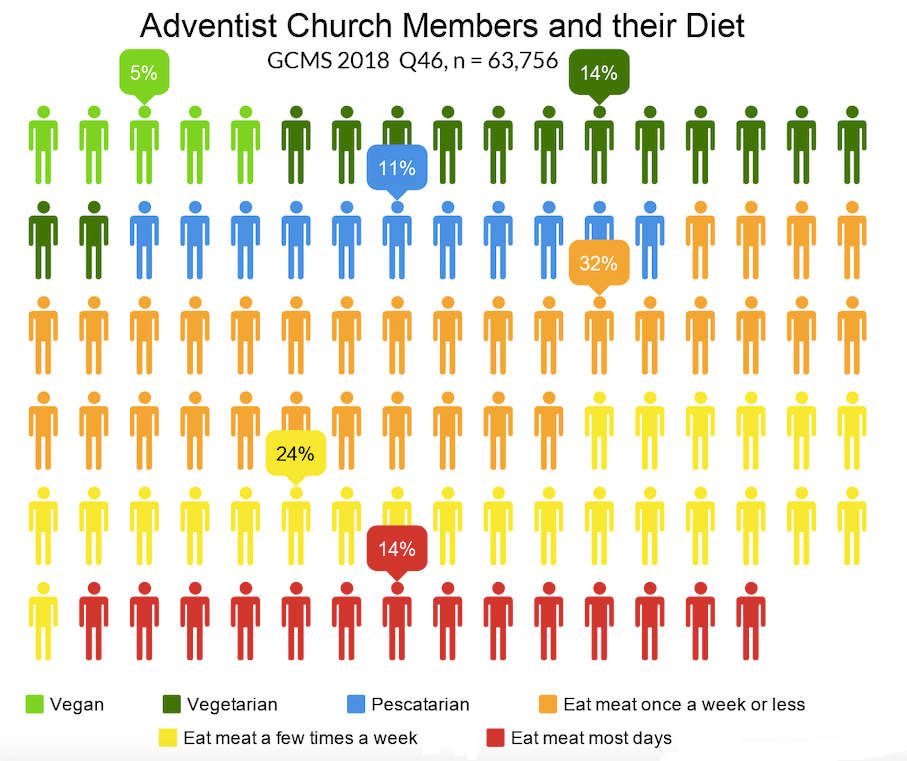In our last blog, we talked about the importance of the Health Message and the way people understand its purpose around the world: one of its key aspects is the emphasis on a clean and healthy diet. While the Adventist Church does not ban the eating of meat, many Adventists choose to adopt this lifestyle. According to General Conference Adventist Health Ministries((To learn more about what Adventist believe regarding diet, click here: https://healthministries.com/articles/gc-nutrition-council/factsheet-vegetarian-diets)), “Common reasons for choosing a vegetarian diet include personal health concerns, religious beliefs, ethical issues as they relate to the welfare of animals, environmental concerns, economic reasons, and philosophical reasons.” In other words, people—in and outside of the Adventist Church—choose to avoid meat for a variety of different reasons. Still, a significant number of church members choose to limit their meat intake.
As part of the 2018 Global Church Member Survey (GCMS), members around the world were asked about their diet (Q46). Five percent of worldwide respondents shared that they are vegan, and another 14% reported that they are vegetarian. Additionally, 11% shared that they are pescatarians – that is, they eat fish but do not consume any other meat. Almost a third (32%) of respondents shared that they eat meat once a week or less, and about a quarter (24%) eat meat a few times a week. Fourteen percent of respondents said that they eat meat most days of the week.

One of the reasons that church members worldwide are likely to limit their meat intake is because of the well-documented correlations between eating meat and several kinds of diseases. For example, the Adventist Health Ministries reports that:
Scientific evidence accumulated over the past half century has shown conclusively that a well-balanced vegetarian diet is not only nutritionally adequate but also conveys health benefits. Many chronic diseases (such as heart disease, stroke, cancer, type 2 diabetes, and obesity) can be either prevented or managed by following a vegetarian diet. Well-planned vegetarian diets have been shown to be appropriate for individuals during all stages of the life cycle, including pregnancy, lactation, infancy, childhood, and adolescence, as well as supporting top athletic performance. (General Conference Adventist Health Ministries, 2017)
Moreover, the benefits of a vegetarian diet are well demonstrated in the lives of people in Loma Linda: an area called a “blue zone” where people live about a decade longer than the average population. Alongside with a weekly rest day on Sabbath, regular exercises, a positive attitude, etc., their diet for most of their lives was composed mainly of vegetables (33%), fruits (27%), whole grains (7%), nuts and seeds (2%), legumes and soy (12%) and of very little animal food: 5% of meat, poultry, fish, and 10% of dairy products. You can read more about this study and health benefits of regular intakes of fruits, vegetables, and nuts here.
When you consider your own diet – as well as the rest of your lifestyle choices – do you feel that you are living to your fullest physical potential? If not, what choices do you think you could make that would allow you to live a healthier, more fulfilling life? After all, “…do you not know that your body is a temple of the Holy Spirit within you, whom you have from God? You are not your own, for you were bought with a price. So, glorify God in your body” (1 Cor. 6:19-20 ESV).
Don’t miss our next blog where we will discuss some more healthy (or unhealthy) choices that Adventist Church members make regarding substances like alcohol and tobacco.
For more data on both 2013 and 2018 GCMS look at the following presentations by Dr. David Trim from the Office of Archives, Statistics, and Research:
- Annual Council 2013 Research Report, David Trim
- 2018 Annual Council – Global Church Member Survey Data Report | [Watch Video]
Creado en colaboración con el Instituto del Ministerio de la Iglesia (Institute of Church Ministry).
Published by ASTR

